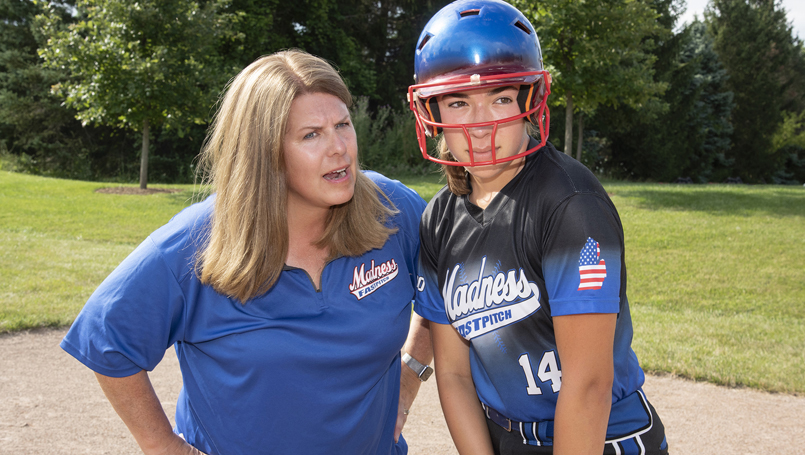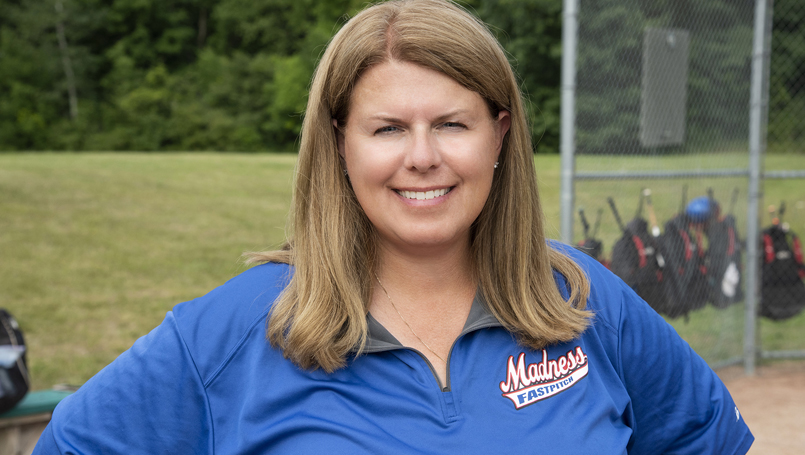Wednesday, August 15, 2018

Update: This past November, Maureen, now 49, wasn’t feeling well. She said, “After careful screening with colonoscopies a new cancer was found in my colon. My surgeon and colorectal cancer specialist, Dr. Wasvary, and I decided a subtotal colectomy was needed. On Jan. 7, all of my large intestine, with the exception of my rectum was removed.” Now, her small intestine is connected to her rectum. She added, “All of my pathology is very good. I’m 9 weeks post-surgery and starting to feel much better.”
She says her recent surgery presents new challenges and looks forward to returning to the softball diamond. However, like any good coach, she knows it will involve adjustments. Presently, Carlson concedes she’s not sure what adjustments she’ll have to make, but wants to return as a coach in some capacity.
Having coached softball for 26 years, Maureen Carlson, 48, of Farmington Hills, knows a thing or two about the importance of preparing for tough opponents, but this past winter, she got news about another formidable foe – cancer. Coincidentally, it was a softball coach, who also happens to be a cancer specialist, who put her at ease and back on the field.
Carlson leads a busy life - raising five children, ages 14-22, and coaching a 16U travel softball team. Almost every weekend during the summer, she and her daughter Caroline travel to softball tournaments. While away, her husband John manages the household and attends games whenever possible.
In January, after experiencing a change in bowel habits, Carlson had a colonoscopy. The results showed that she had developed colon cancer. This led to the daunting task of having to tell her children. “It was a difficult conversation,” Carlson said. “Especially with having five children living in different parts of Michigan and wanting to tell them at the same time.”
Carlson and her husband quickly got to work interviewing cancer specialists from three area health systems for the best cancer program and team of experts. In the end, she decided to receive treatment at Beaumont Hospital, Royal Oak. “Beaumont felt like home,” explained Carlson. “The entire process was seamless. The doctors, nurses and staff worked hard to fit me in quickly and were thoroughly prepared with a great deal of information about how my case would be handled. It was impressive and I knew it was the right choice.”
Carlson added, “At my first appointment, Dr. Wasvary mentioned my chart showed I was a softball coach and that he also coached. I love softball. It is my passion, so we instantly connected and it put my mind at ease. That really helped. We shared something in common.”
Harry Wasvary, M.D., medical director, Colorectal Multidisciplinary Tumor Clinic, Beaumont, Royal Oak, and Carlson decided the best course of action would be a colectomy, a laparoscopic surgery that would remove the cancerous part of her colon.
Dr. Wasvary used softball analogies to connect with Carlson and help explain certain aspects of her surgery.
“We look for improved patient outcomes from the Enhanced Recovery After Surgery program,” said Dr. Wasvary. “I explained ERAS to her by comparing it to an athlete preparing for a big game. Patients need to prepare physically and mentally for surgery, just like an athlete before their event.”
Carlson’s colectomy took place in February. The cancerous part of her colon was removed along with 15 surrounding lymph nodes. Post-surgical biopsy results on the colon tissue as well as the lymph nodes showed the colon cancer was stage 1 and had not spread beyond the area of the colon, therefore no chemotherapy or radiation was necessary.
The surgery was a success, but it took some time to recover. After six weeks of rehabilitation, Carlson was back to a regular routine, driving her kids around, gradually working out and coaching again.
Dr. Wasvary said, “Maureen was a good patient. She was mature about the whole approach and very motivated to get everything done and move on from this.”

Today, Carlson is doing well.
“I feel good. I have made a tremendous amount of progress since my surgery,” she said. “I am able to do what I want and feel great about it.”
Carlson’s diagnosis, along with a family history of breast cancer, influenced her to receive genetic testing at Beaumont, Royal Oak. The results showed she was positive for PALB2, a hereditary gene that increases the risk of breast, pancreatic, ovarian and colon cancers.
According to the American Cancer Society, colon cancer is the third leading cause of cancer-related deaths among men and women in the United States. Although the survival rate for stage 1 is 92 percent, it drops to 11 percent at stage 4. Screening colonoscopies are key to detecting colorectal cancer early.
Dr. Wasvary urges everyone, “Patients are coming in for colon cancer at a much younger age. It is important to know your family history, look for the symptoms and come in at all of the appropriate times for a screening.”
Since colon cancer patients are getting younger, the new recommended age for a screening is 45. Anyone who is about that age, or experiencing changes in bowel habits, should schedule a screening colonoscopy today.
